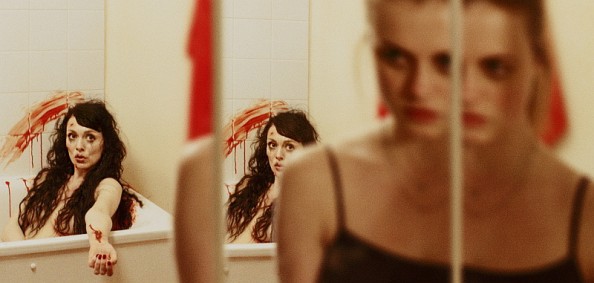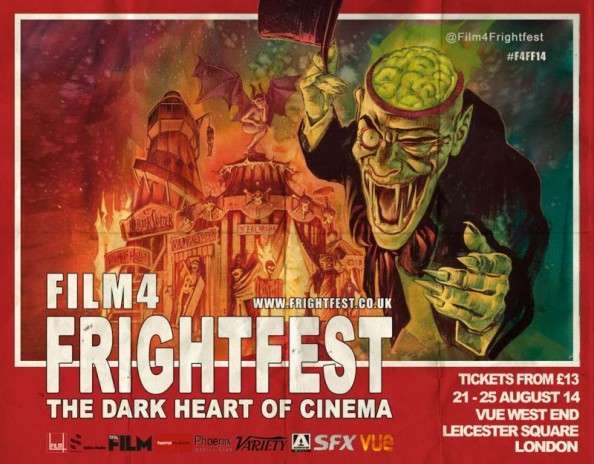
16th Film4 FrightFest
27-31 August 2015
Vue West End,
Prince Charles Cinema, Phoenix, London
FrightFest website
This year again, Film4 FrightFest offered a brilliantly diverse programme that encompassed all aspects of horror and fantasy, with some great category-defying gems. Interestingly, female protagonists widely dominated the line-up, and many of them were appealingly diverse, complex and nuanced characters, ranging from troubled temptresses to tragic mothers, babysitters to scientists, confused teenagers to imperious mistresses.
One of the highlights was Ben Cresciman’s beautifully crafted psychological thriller Sun Choke, which was the most cinematographically and thematically accomplished of the festival. An ethereal, dreamlike, elliptical portrayal of a possibly psychotic young woman, it intelligently and chillingly explored the tortuous, ambivalent relationship she has with her domineering carer, played by the superb Barbara Crampton.
Darkly erotic and intemperately stylish, Goddess of Love was also centred around a psychotic woman. Co-scripted by lead actress Alexis Kendra, it plunged into the delusional obsessiveness of an unstable woman as she increasingly loses her grip on reality after her lover leaves her. Sadly, the overly explanatory ending undermined the seductively unstable reality created until then.
For its part, Nina Forever offered a highly unusual take on female darkness. One of the great surprises of the festival, it was a bittersweet, melancholy and inventive tale of love, grief and the difficulty of getting rid of one’s ghosts. When morbidly inclined checkout girl Holly falls in love with the suicidal Rob, it seems like he may finally be able to put the death of his girlfriend Nina behind him. But Nina won’t go away so easily, and they have to deal with her very tangible, bloody, sardonic presence in their bed. Although the tone shifting between offbeat comedy and horrific drama is at times a little clumsy, it is a truly original, and very affecting film that treads a fresh path.
Not all female-led films were successful. After a compelling, unsettling first part, in which a new babysitter introduces chaos and sexual tension into the conventional suburban world of her charges, Emelie descended into an unconvincing and predictable thriller fodder about thwarted maternal desires. Also themed around maternity, Bruce McDonald’s Halloween tale Hellions, his follow-up to 2008’s Pontypool was equally disappointing. On Halloween, a teenager who has just found out she is pregnant must fight evil childlike monsters who come knocking on her door, demanding not sweets, but her unborn child. As she steps out into the strange light of a blood moon, the image is drained of colour and becomes startlingly artificial. This is not a bad thing in itself, but with a plot that jerks incoherently into varying directions, the visual effects that are meant to support it remain contrived and hollow.
Interestingly, Bernard Rose’s modern update of Frankenstein transferred the focus of the monster’s love and anguish from the male creator to the scientist mother figure, making explicit the maternal anxiety that had originally fed Mary Shelley’s novel. Extrapolating on the possibilities of modern technology while based on a close reading of the novel, the film is seen from the perspective of the inarticulate creature. Originally given perfect beauty, he falls from grace and is forced into desperate, squalid survival after a flaw in the procedure of its creation causes horrific disfigurement. A visually ravishing poetic take on the misunderstood hideous monster despite a somewhat bombastic ending.
The focus was also on the mother in New England ghost story We Are Still Here. An openly referential film that played like a cross between House by the Cemetery and The Fog, it stars Barbara Crampton as a grieving mother who moves to an old isolated house with her husband in a bid to get over her son’s death. Expressive and poignant, Crampton was ably seconded by Larry Fessenden, who was his usual brilliant self as one half of the hippie couple who try and help her to contact the spirit of her dead son. All slow-burn creepiness in the first part, culminating into a blood bath at the end, it was a well-crafted, enjoyably eerie tale that used its influences smartly.
After the emergence of Israeli horror in the last few years, the surprise geographical discovery this year was Georgia with Landmine Goes Click. One of the most divisive films of the festival, it set a trio of American tourists up for trouble in a remote Georgian mountain when one of the party accidentally steps on a mine. After apparently heading for a rape and revenge kind of story, it veers unexpectedly away to offer instead a scalpel-cold study of the terrible chain of causes and consequences that leads to the shocking, tragic ending. In a world dominated by betrayal, distrust and abusive power, the main characters are all guilty and provoke their own downfall through the cruel games they play with one another.
Among the documentaries, the fascinating story of Future Shock! The Story of 2000AD was more than worth a look while our friends at the Duke Mitchell Film Club presented the excellent Remake, Remix, Rip-Off, about low-budget Turkish remakes of Hollywood blockbusters in the 1960s-70s. This was followed by the Duke Mitchell Film Party, which proved as deliriously entertaining as last year’s extravaganza, with guests, among which Barbara Crampton, presenting clips of new work or hilariously dubious trailers.
The diverse retrospective programme included Brian Clemens’s 1970 Hammer swashbuckling horror adventure Captain Kronos: Vampire Hunter, Sergio Martino’s seductively perverse giallo Your Vice Is a Locker Room and Only I Have the Key, with the stunning Edwige Fenech, Clive Barker’s classic Hellraiser, Philip Ridley’s startling 1990 debut The Reflecting Skin and Uli Lommel’s 1970s serial murderer tale Tenderness of the Wolves.
Virginie Sélavy

